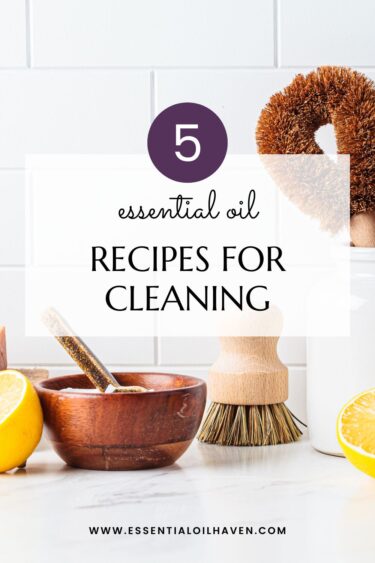 Using essential oils for cleaning is a great way to maintain a healthy, environmentally friendly home. It is a 100% natural way to clean.
Using essential oils for cleaning is a great way to maintain a healthy, environmentally friendly home. It is a 100% natural way to clean.
I love when my home is fresh and clean. I think better, I feel better, I get more done and I relax more.
Commercial cleaning products are often full of chemicals that you don’t want in your home.
Essential oils can disinfect, brighten, kill mold and mildew, and prevent bacteria from creeping in. The oils also smell great, which helps to create a nurturing and healthy home environment.
Given the many choices of oil brands available today, you have a lot of variety to work with! Luckily, basic essential oils for cleaning are quite commonly part of many starter kits.
If you have a set of oils at home, chances are, you’re already ready to switch to oils for your cleaning product needs.
How to Switch to Natural Cleaning
Switching to natural cleaning is easier than you might think!
Here’s how to put together your all-natural cleaning kit:
- Amber glass spray bottles (like these ones here)
- Fine mist spritz bottles (like these ones here)
- Baking soda
- White vinegar
- Distilled water
- Rags
- Scrub Brushes
Now that you’re all set-up with the ingredients, onto the fun part! Which oils to use and how to make your first DIY essential oil cleaner recipe!
5 Best Essential Oils for Cleaning
Choosing which oil to use for cleaning depends a lot on your preference for smells. All of the oils featured in this list have antibacterial qualities. Some also have anti-fungal qualities as well, some have both.
The list below gives an overview on how to use your oils for cleaning. I’ll explain each oil, why it works for cleaning, and how you can quickly whip up a DIY recipe with it to try in your home.
1. Tea Tree Oil
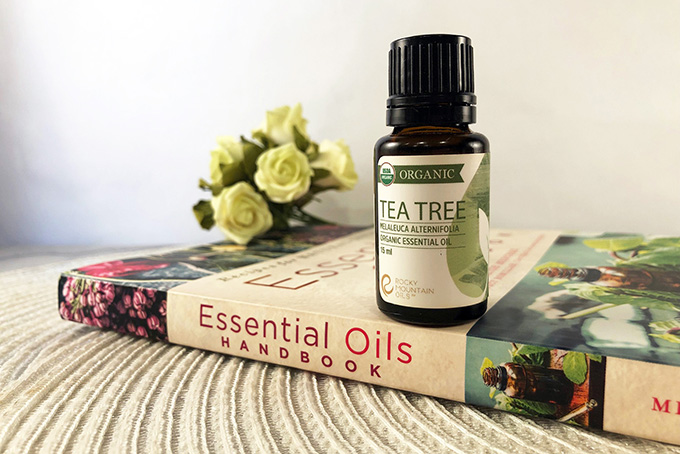
Rocky Mountain Oils carries a beautiful Certified Organic Tea Tree Oil.
Get it Here
Tea tree (Melaleuca alternifolia) is the first choice for a cleansing essential oil. It’s strongly antibacterial and anti-fungal, and with that, can fight bacteria, viruses, bugs and germs. It can also clean and prevent mold and mildew in the home. If you have an area that smells musky in bathrooms, kitchens or attics, grab this oil!
My homemade cleaning spray recipe is great for bathrooms, garbage bins, under sinks and on floors.
Tea Tree All-Purpose Cleaning Spray
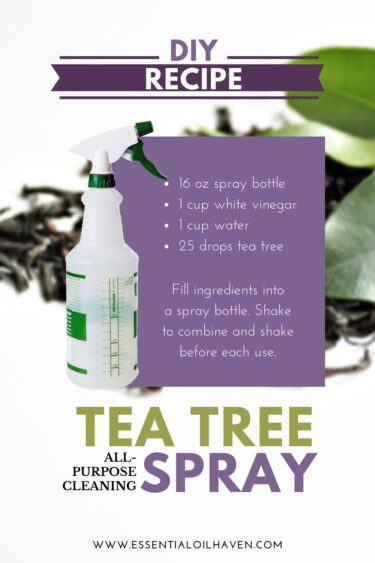
- 16 oz spray bottle
- 1 cup white vinegar
- 1 cup water
- 25 drops tea tree essential oil
- Fill ingredients into a spray bottle. Shake to combine and shake before each use.
Substitute oils: eucalyptus, peppermint
2. Lemon Oil
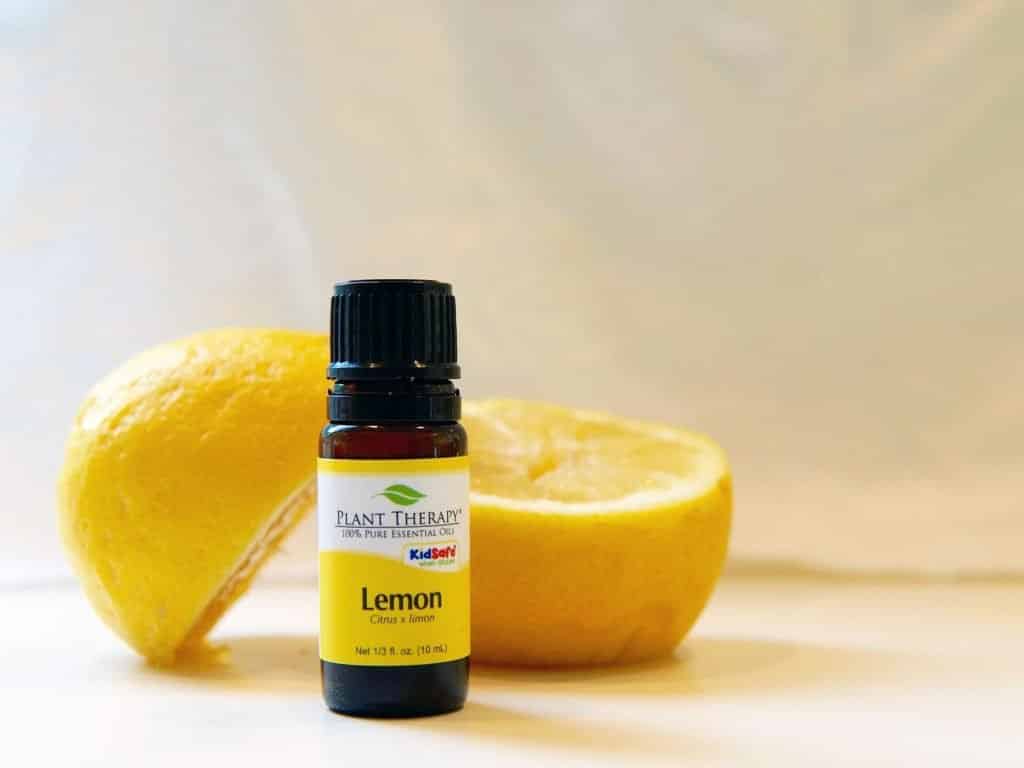
Lemon Essential Oil from Plant Therapy
Shop Here
Lemon oil (Citrus limon) leaves that fresh, citrus-y scent without any synthetic fragrances. Is my favorite oil for cleaning! It fights bacteria and fungi, lightens and brightens surfaces and smells amazing.
It works as an antimicrobial agent and removes dirt from around the home. I like to use it in a scrub paste for counter tops, stove tops, or sinks to clean stubborn dirt.
Lemon Scrub Paste
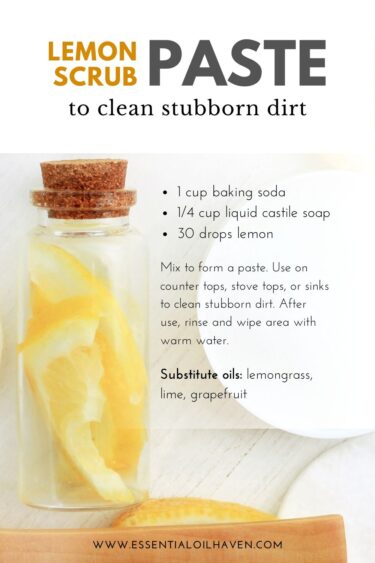
- 1 cup baking soda
- 1/4 cup liquid castile soap
- 30 drops lemon
- Mix to form a paste. After use, rinse and wipe area with warm water.
Substitute oils: lemongrass, lime, grapefruit
3. Lavender Essential Oil
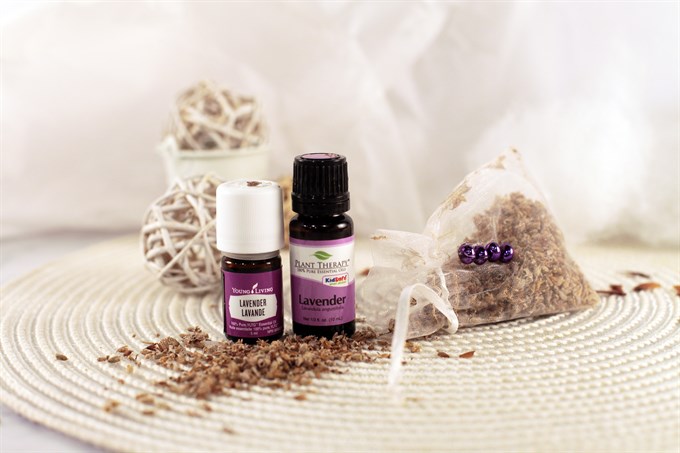
Lavender Essential Oils from Young Living and Plant Therapy
Shop here
Lavender is one of the most versatile oils. It smells amazing and has tranquil healing properties as well, making it a nice essential oil to enjoy while cleaning your space.
Lavender has anti-fungal, antibacterial and antimicrobial properties. It removes mold and mildew and prevents bacteria and fungus from re-forming.
Use its soothing scent in the bedroom to reduce stress and aid with sleep, all the while keeping your bedroom bacteria free. It’s also great to disinfect toys as it’s an oil that’s safe for kids.
Lavender Linen Spray
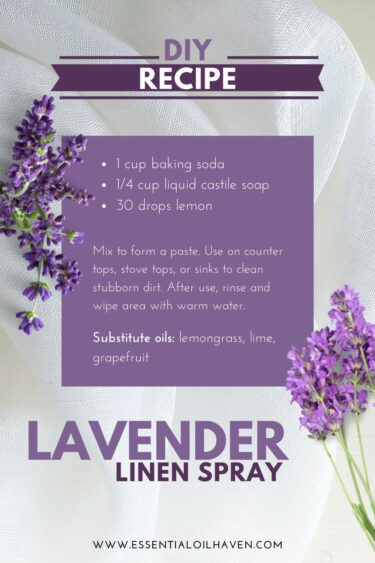
- 4 oz fine mist spritz bottle
- 3 oz distilled water
- 2 tbsp (=1 oz) vodka or rubbing alcohol
- 30 drops lavender
- Combine ingredients in a fine mist spritz bottle and shake well before each use. Spritz onto sheets, linens, fabrics, pillowcases, and mattresses.
Substitute oils: rosemary
4. Orange Oil
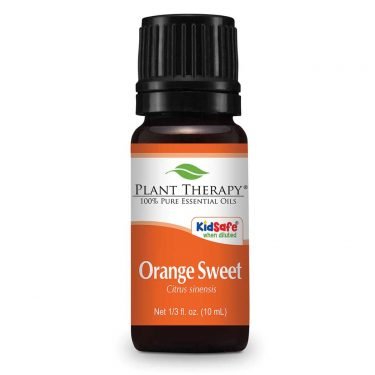
Orange essential oil from Plant Therapy
Shop Here
Orange oil helps to break down grease and product build up from sinks, counters and tubs, making it a fantastic oil to clean with.
Similar to Lemon, Orange oil fights bacteria and fungi. In fact, all citrus oils do.
Orange oil lightens and brightens surfaces and has a nice, clean smell. You can use either Sweet Orange or Wild Orange.
Orange Oil Grease Fighter Spray
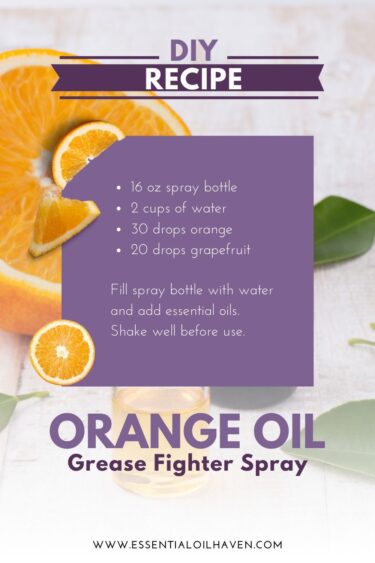
- 16 oz spray bottle
- 2 cups of water
- 30 drops orange
- 20 drops grapefruit
- Fill spray bottle with water and add essential oils. Shake well before use.
Substitute oils: lemon, lime, lemongrass
5. Peppermint Oil
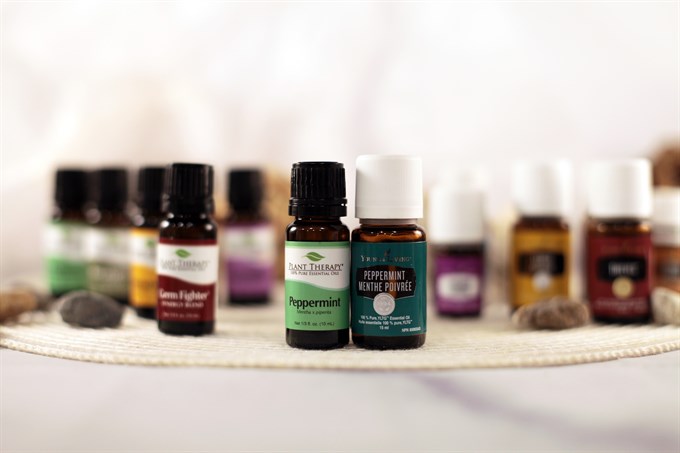
Peppermint essential oils from Plant Therapy and Young Living
Shop here
Peppermint is a strong essential oil. Its anti-bacterial qualities fight germs and pests in the home. It is also a great insect repellent (ticks, mosquitoes, spiders, ants, and cockroaches). It can ward off headaches and fever in the body.
To send the pests packing, use 10 – 15 drops in a spray bottle and spraying it into the nooks and cracks of your space where insects tend to rally.
Peppermint Mirror + Window Cleaner
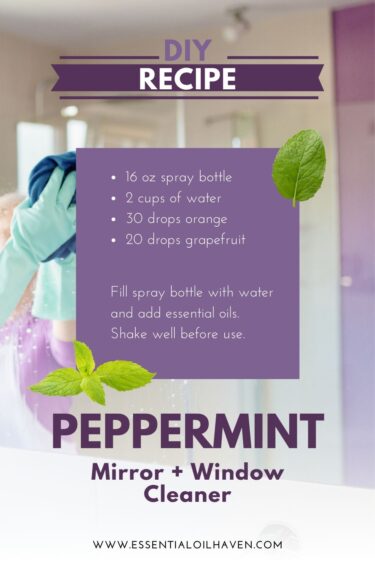
- 16 oz amber glass spray bottle
- 1.5 cups distilled water
- 1 tbsp white vinegar
- 1 tbsp clear grain vodka or rubbing alcohol
- 25 drops peppermint
Substitute oils: eucalyptus, spearmint, wintergreen
Final Thoughts
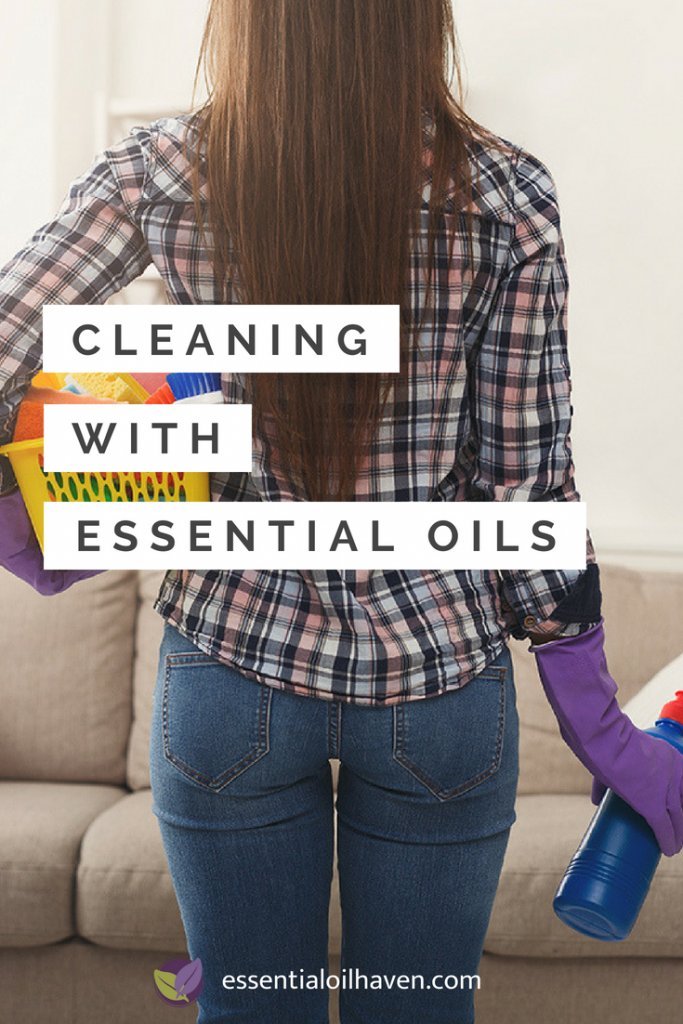
I hope you learned how to clean your house without using harsh chemical products, and instead reach for your essential oils for cleaning.
Start by replacing one or two of your regular cleaning products with these natural solutions, and you’ll quickly see how effective and pleasant natural cleaning can be.
As you try different natural cleaning recipes, you’ll get better at it and discover new ways to use essential oils to clean your house.
Happy cleaning!

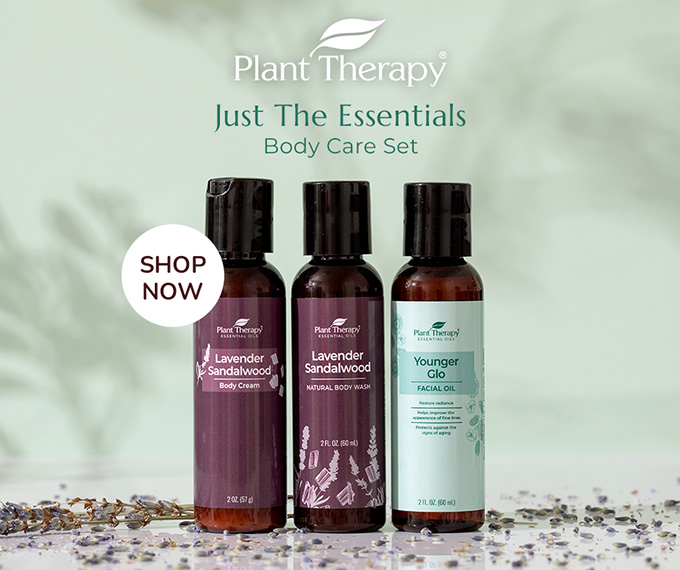


Jacqueline E Koscheski
Lisa, don’t use plastic spray bottles. The oils recommended here will eat through the plastics bottles. Use dark glass container to store the mixture. The spray, just add enough in a small spray bottle for one use. Don’t store unused in plastic, put back in glass container. Most oils is stored in a cool, dark, dry area will last much longer than most oils. Just don’t over make a lot of product!
Lisa
Also, I noticed that the spray bottles you linked to appear to be plastic, not glass. I have read on other DIY sites that oils don’t store well in anything besides dark glass. Can you comment on that?
Lisa
How long can these mixtures be safely stored? I have the same question for other oily mixtures, like a skin salve?